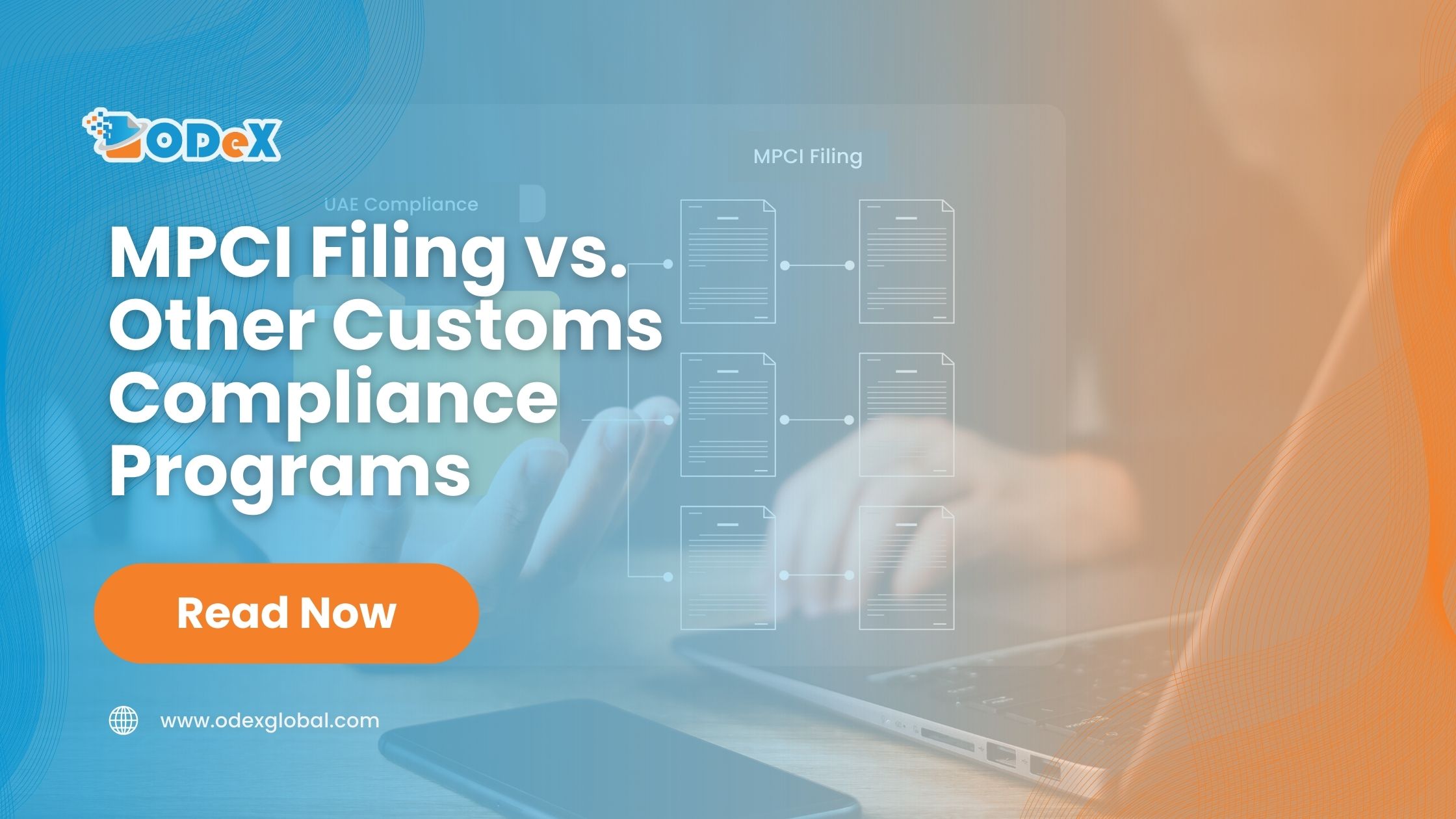MPCI Filing vs. Other Customs Compliance Programs - Key Differences
In today’s fast-moving world of global trade, customs compliance programs play a crucial role in ensuring cargo moves smoothly and securely across borders. Among these, Maritime Preload Cargo Information (MPCI) filing is a relatively new but mandatory requirement in the UAE. While it may seem similar to other international customs compliance frameworks, MPCI has unique features that make it different.
In this blog, we’ll break down how MPCI filing compares to other customs compliance programs such as AMS (U.S. Automated Manifest System), ACI (Canada’s Advance Commercial Information), ENS (EU’s Entry Summary Declaration), and Japan’s AFR (Advance Filing Rules).
What is MPCI Filing?
MPCI (Maritime Preload Cargo Information) is a mandatory filing requirement by the UAE’s National Advance Information Center (NAIC).
-
It applies to all containerized shipments entering, transshipping, or remaining on board at UAE ports.
-
Shipping Lines, NVOCCs, and Freight Forwarders must submit cargo data in advance for customs security clearance.
-
The goal is to enhance port security, improve trade efficiency, and reduce clearance delays.
How MPCI Differs from Other Customs Compliance Programs
1. Jurisdiction & Applicability
-
MPCI (UAE): Exclusive to shipments moving through or into UAE ports.
-
AMS (USA): Applies to all imports into the U.S., with cargo data submitted 24 hours before loading at origin.
-
ACI (Canada): Mandatory advance filing for cargo arriving in Canada.
-
ENS (EU): Covers all shipments entering the European Union.
-
AFR (Japan): Requires advance filing for containerized cargo heading into Japan.
🔑 Key Difference: MPCI is region-specific to the UAE but modeled on global best practices.
2. Data Submission Timeline
-
MPCI: Shipment data must be filed before vessel loading at the port of origin.
-
AMS (U.S.): 24 hours before vessel loading.
-
ACI (Canada): At least 24 hours prior to cargo arrival.
-
ENS (EU): Must be submitted prior to vessel departure.
-
AFR (Japan): 24 hours before vessel loading.
🔑 Key Difference: MPCI aligns closely with the 24-hour rules of AMS, ENS, and AFR, but it is tailored to UAE’s security requirements.
3. Filing Responsibility
-
MPCI: Primarily the responsibility of Shipping Lines, Freight Forwarders, and NVOCCs.
-
AMS/ACI/ENS/AFR: Responsibility typically lies with carriers, freight forwarders, or their agents.
🔑 Key Difference: MPCI has a broader inclusion of stakeholders in the UAE supply chain.
4. Regulatory Authority
-
MPCI: Managed by the National Advance Information Center (NAIC), UAE.
-
AMS: U.S. Customs and Border Protection (CBP).
-
ACI: Canada Border Services Agency (CBSA).
-
ENS: European Union Customs Authorities.
-
AFR: Japan Customs.
🔑 Key Difference: Each program is government-driven, but MPCI is part of UAE’s broader vision for trade digitization and security.
Why MPCI Matters for Global Shippers
For global trade companies, understanding MPCI’s unique compliance rules is critical to avoid delays, penalties, and cargo holds in UAE ports. Unlike other programs, MPCI has been designed with digital-first workflows, allowing seamless submission and tracking through platforms like ODeX.
With ODeX, you can:
-
Upload shipment data easily (single or bulk).
-
Validate filings in real-time to reduce errors.
-
Track status updates for complete visibility.
-
Stay 100% compliant with UAE’s MPCI regulations.
FAQs on MPCI Filing
Q1. What is MPCI filing?
MPCI (Maritime Preload Cargo Information) is a mandatory customs compliance filing for containerized cargo entering, transshipping, or remaining on board in the UAE.
Q2. Who needs to file MPCI?
Shipping Lines, Freight Forwarders, and NVOCCs transporting cargo through UAE ports must submit MPCI data.
Q3. When should MPCI filing be submitted?
Shipment data must be uploaded before vessel loading at the port of origin.
Q4. What happens if MPCI filing is missed or incorrect?
Non-compliance may lead to delays, penalties (if any), or cargo not being cleared at UAE ports.
Q5. How does ODeX help with MPCI filing?
ODeX provides a 100% digital solution to upload, validate, and track MPCI filings, ensuring fast, accurate, and secure compliance with NAIC regulations.
Final Thoughts
While MPCI filing shares similarities with other customs compliance programs worldwide, its UAE-specific scope, digital-first model, and broader filing responsibility make it unique. For shipping lines, NVOCCs, and freight forwarders operating in the Middle East, mastering MPCI is not optional—it’s a compliance necessity.
By partnering with trusted platforms like ODeX, global shippers can ensure fast, accurate, and secure MPCI submissions, keeping their cargo moving without delays.
Start your MPCI filing today → Register on ODeX
Learn More About MPCI
Visit our MPCI Services page or reach out to us at mpci.uae@odexglobal.com


















